Businesses are facing a lot of challenges today.
The last couple of years have been very turbulent for people around the globe, but it's been especially harsh for entrepreneurs. Inflation, economic downturns, supply chain snafus, seismic shifts in marketing strategy, and attribution, to just name a few obstacles.
In times of economic uncertainty, it’s common and generally wise for businesses to reassess and cut their costs. Unfortunately, the first sector to cut is usually marketing—we saw this happening in full force during COVID.
This can be surprisingly counterproductive.
The truth is that consumer needs persist across economic climates. People will continue to seek solutions to their problems — the key difference is the type of messaging they will react to and their shifts in buying behavior.
By pulling back on marketing, businesses sacrifice long-term growth for short-term gains.
Rather than scaling down marketing efforts, the key lies in optimizing your marketing efficiency. This leads to a critical consideration for businesses today: is handling their marketing in-house or partnering with a marketing agency more profitable, and which option is better in the long run?

We have already written about how to navigate the marketing career between agency and in-house, and if you’re a marketer at a crossroads looking for an answer to that question, you might find that article useful.
But, whether you are a business owner, a CEO, a manager, or any other decision-maker, this blog post is just for you. Having worked with 100+ different businesses, we feel that our experience can bring some interesting perspectives to this debate.
This article aims to explore the pros and cons of each option, providing insights to help you make the best choice for your business in 2024.
Section 1: In-House Marketing
When we talk about “in-housing,” it basically means keeping all the marketing action under one roof.
"In-house refers to conducting an activity or operation that is performed within a company, instead of relying on outsourcing. "
In this case, instead of reaching out to external agencies for help, you and your team handle everything from brainstorming to execution. You will be responsible for finding, hiring, training, and managing the team to hit your goals.
Now, let’s look deeper into the pros and cons of in-house marketing.
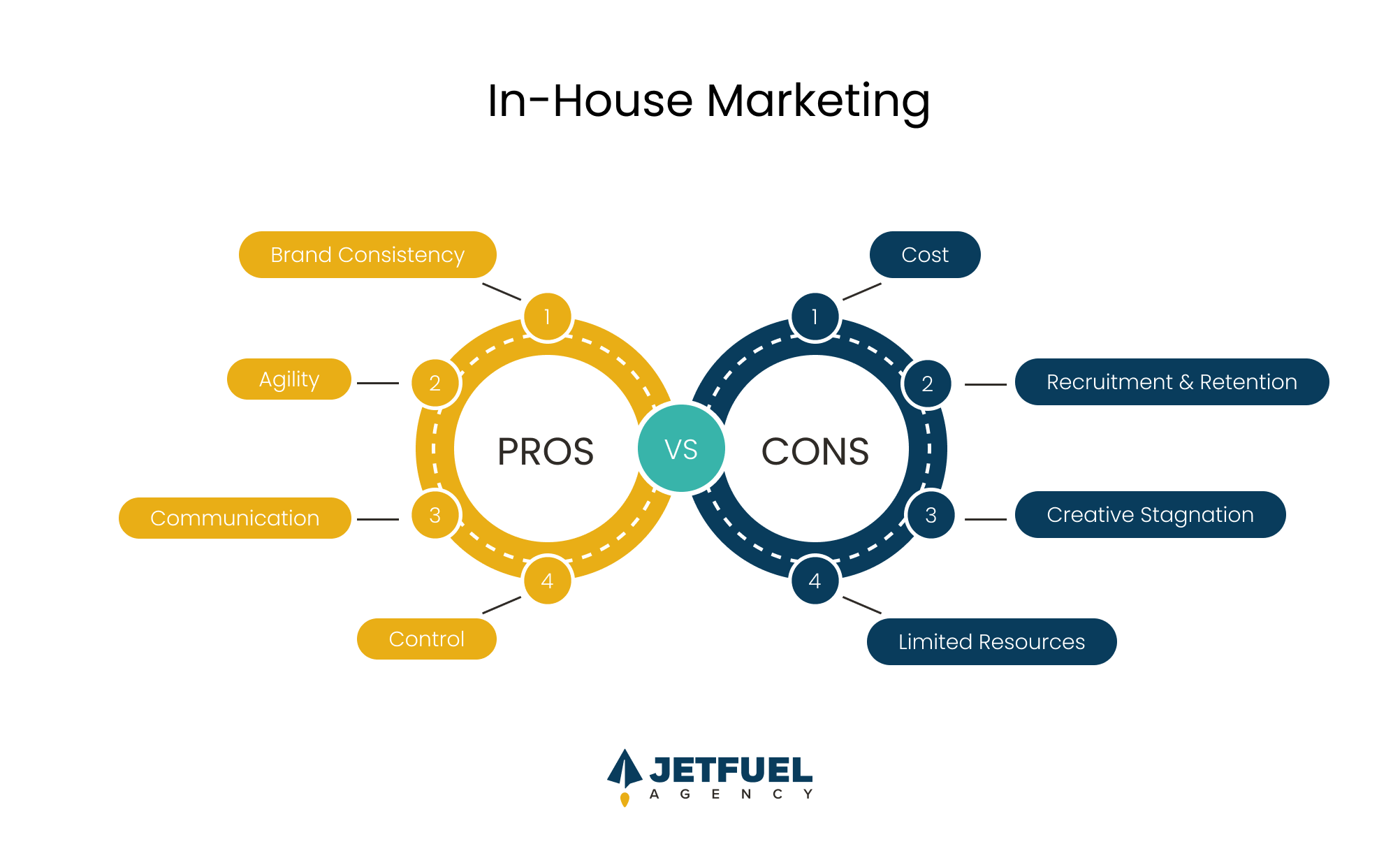
Advantages of In-House Marketing
Let’s start with what you get with an in-house marketing team. We’re going to look into these aspects:
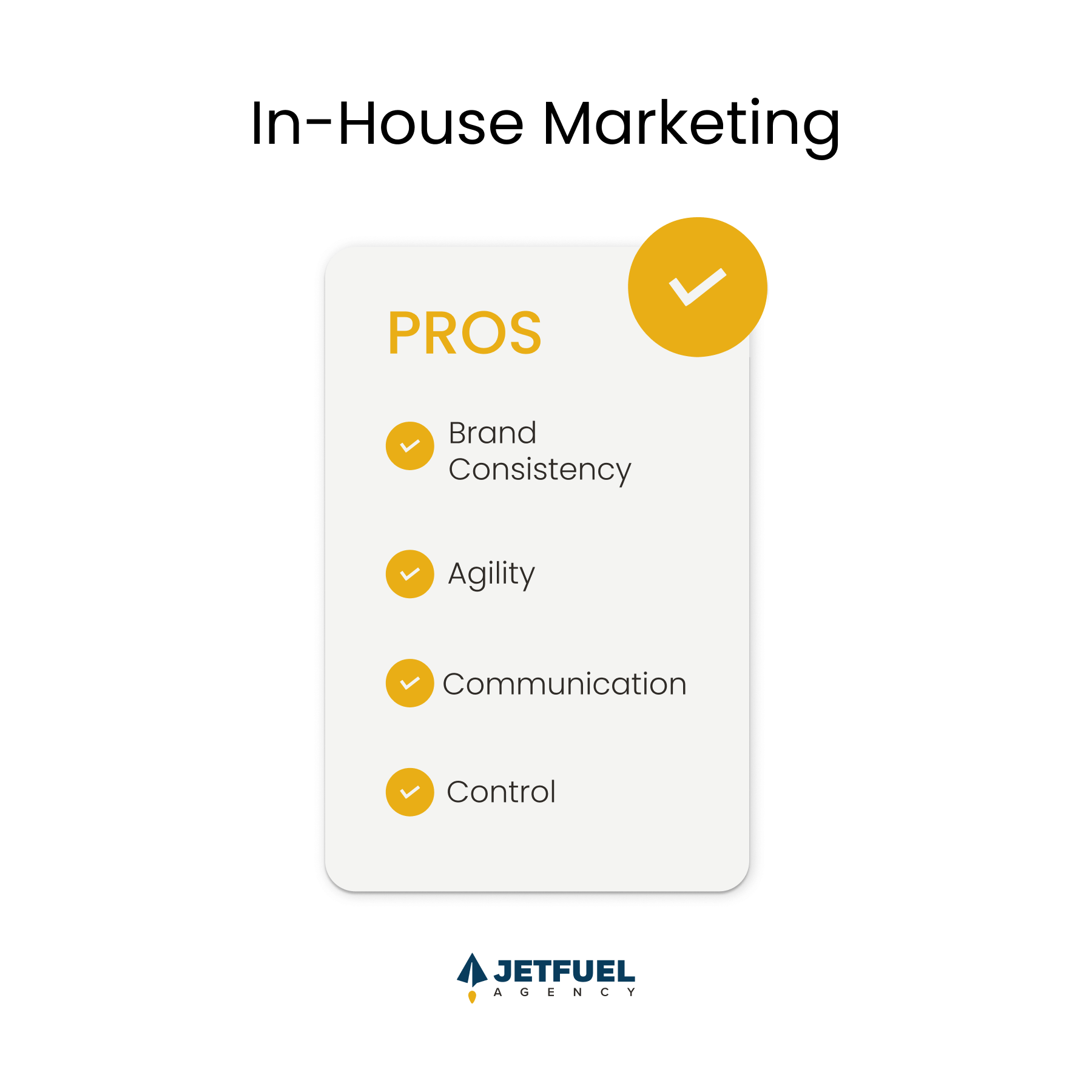
1. Brand Consistency
An awesome thing about having your own marketing team is how well they know and match your brand's values, goals, and mission. Unlike outside agencies, an in-house team lives and breathes your brand every day, making sure all marketing plans truly reflect your company's beliefs and future plans.
Being so close, they can make super personalized marketing strategies that really connect with your target audience. Plus, it keeps your branding and messages consistent across all marketing platforms. By using direct feedback and data, your team can keep learning, testing, and improving strategies to better match your business objectives and what your customers like.
Imagine a global technology company like Apple or Google. These companies have in-house marketing teams deeply familiar with their products and brand ethos. They create instantly recognizable campaigns, ensuring every message aligns with their vision and values.
2. Agility
In-house teams are great at being quick and adaptable. They're right there with the brand and its inner workings, so they can react fast to market changes, feedback, or company news. This means they can make decisions and start campaigns quickly, and adjust their marketing plans ad hoc.
For example, imagine an in-house marketing team at a tech company needing to change its strategy because of a sudden trend change.
Working together every day builds a lot of shared understanding and communication without even needing to say much. With their independence and easy access to decision-makers, the team can quickly assess the situation, suggest needed changes, and put a new plan into action without wasting time.
However, some in-house teams might struggle with speed due to depending on the schedules and skills of their coworkers, which can be limited.
3. Communication
In-house departments are closely connected, so every department can collaborate and communicate quickly. This integration offers a holistic approach to marketing campaigns. They can combine insights from sales, product development, and customer service to achieve successful outcomes.
For example, let's consider an in-house marketing team at a fashion retailer. The marketing, sales, and product development departments work closely together to launch a new clothing line. The marketing team collaborates with sales to understand customer preferences, aligns messaging with design features through product development, and anticipates and addresses potential inquiries with the help of customer service.
This seamless communication and collaboration result in a well-coordinated marketing campaign that resonates with the target audience. As a result, you get more sales and satisfied customers.
4. Control
Having their own team allows businesses to have more control over their marketing campaigns. This control includes making decisions, guiding creativity, and determining the overall marketing strategy direction. By keeping marketing activities in-house, companies can ensure that their campaigns closely align with their brand, values, and long-term objectives, so they can have a more cohesive and consistent approach.
So, if you need to have greater control over your budget, messaging, creatives, and deadlines, then, in-house marketing is probably the best option for you. In a best-case scenario, you will have your own team of digital marketing experts under the same roof, and they will be 100% focused on your brand only.
Downsides of In-House Marketing
Nothing is ideal. Although in-house marketing has its advantages, there are some disadvantages we need to mention. So, let’s move on to explore the cons of handling your marketing in-house through these aspects:
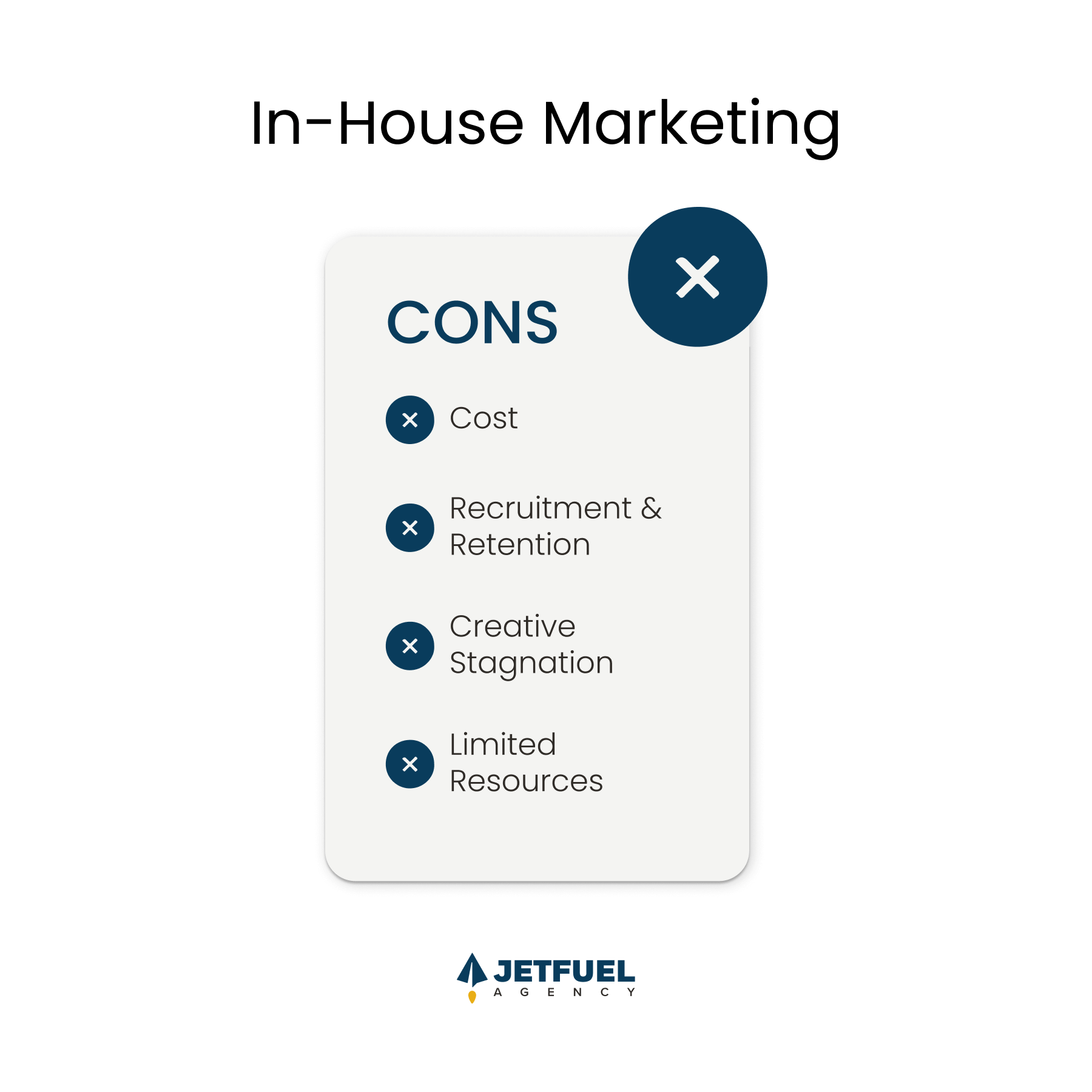
1. Costs
Building an in-house marketing team requires both time and money. You'll need a substantial upfront budget and must consider potential high overhead costs. Next, consider expenses such as office rent, utilities, training, and development, as well as technology and software. These factors are crucial when it comes to creating a skilled team that can help grow your business.
On average, the cost for each in-house marketing employee can exceed $70,000 per year, including not only salaries but also taxes and equipment expenses. Additionally, in-house teams have to cover costs for marketing software and tools, which adds to the financial burden. What's more, you have to invest in ongoing training, software updates, and equipment maintenance.
Additionally, as your business grows, you may need to expand your team, further increasing your costs. It is crucial to carefully evaluate your budget and forecast your needs before committing to an in-house marketing strategy.
2. Recruitment and Retention
More often than not, companies don't have enough resources to assemble a full in-house marketing team of experts. So, what they do is just delegate the entire marketing workload to one of the regular employees, who is already too busy with other tasks.
The thing is that finding and retaining top marketing talent can be a challenge. The competition for skilled marketers is fierce, and attracting them to your organization can be difficult, especially if you are a smaller business or located in a less desirable area. You either need to be a jack-of-all-trades in marketing or shell out big bucks to hire someone who is.
Managing a marketing team internally means you have to know your stuff across the board — from content creation to SEO to social media. If you don't have that expertise, it's hard to pull off a successful marketing strategy.
Moreover, once you have built a talented team, it's important to provide opportunities for growth and development. If your in-house team feels stagnant and lacks growth prospects, they may become disengaged and seek opportunities elsewhere. And when employees leave for better-paying gigs, all that recruitment and training investment goes down the drain.
It's a real challenge balancing recruitment and retention issues while trying to build a skilled in-house marketing team. In short, to have a rock star in-house marketing team, you need more than just hiring savvy. You need to create a space where learning, creativity, and growth are part of the daily grind. Without that, keeping up in the fast-paced marketing arena is going to be a struggle.
3. Creative Stagnation
In-house teams may sometimes suffer from creative burnout or a lack of fresh perspectives. When working on the same brand day in and day out, it can be challenging to constantly generate new and innovative ideas. In-house marketers miss out on the chance to learn from different industries, data points, and strategies that come with managing multiple clients. This lack of exposure can make the team less creative, innovative, and adaptable.
Also, focusing on just one client means they could miss out on staying up-to-date with industry trends, best practices, and new technologies that they would encounter with a more diverse client base. This narrow focus can limit the team's growth, creativity, and effectiveness in running successful marketing campaigns.
4. Limited Resources
With in-house marketing, you have one or a few team members and limited resources, unlike agencies that can tap into a wide range of talents with diverse skills. This means in-house teams may not have experts in the latest marketing trends or technologies. Limited people and tech resources can hold back the quality of their marketing plans and campaigns.
To sum up, an in-house marketing team needs a big investment in talent and resources, but the perks of brand alignment, flexibility, and teamwork are really worth it. These benefits make in-house teams a great asset for businesses trying to tackle the challenges of the 2024 marketing scene. They help ensure that marketing strategies are closely tied to the brand's identity and goals.
Section 2: Agency Marketing
Agency marketing is performed by an external marketing team, which uses various online marketing strategies to grow their clients’ businesses. Agencies typically employ a team of marketing and design experts with a range of specialties. With an agency, you have the opportunity to work with a larger group of professionals.
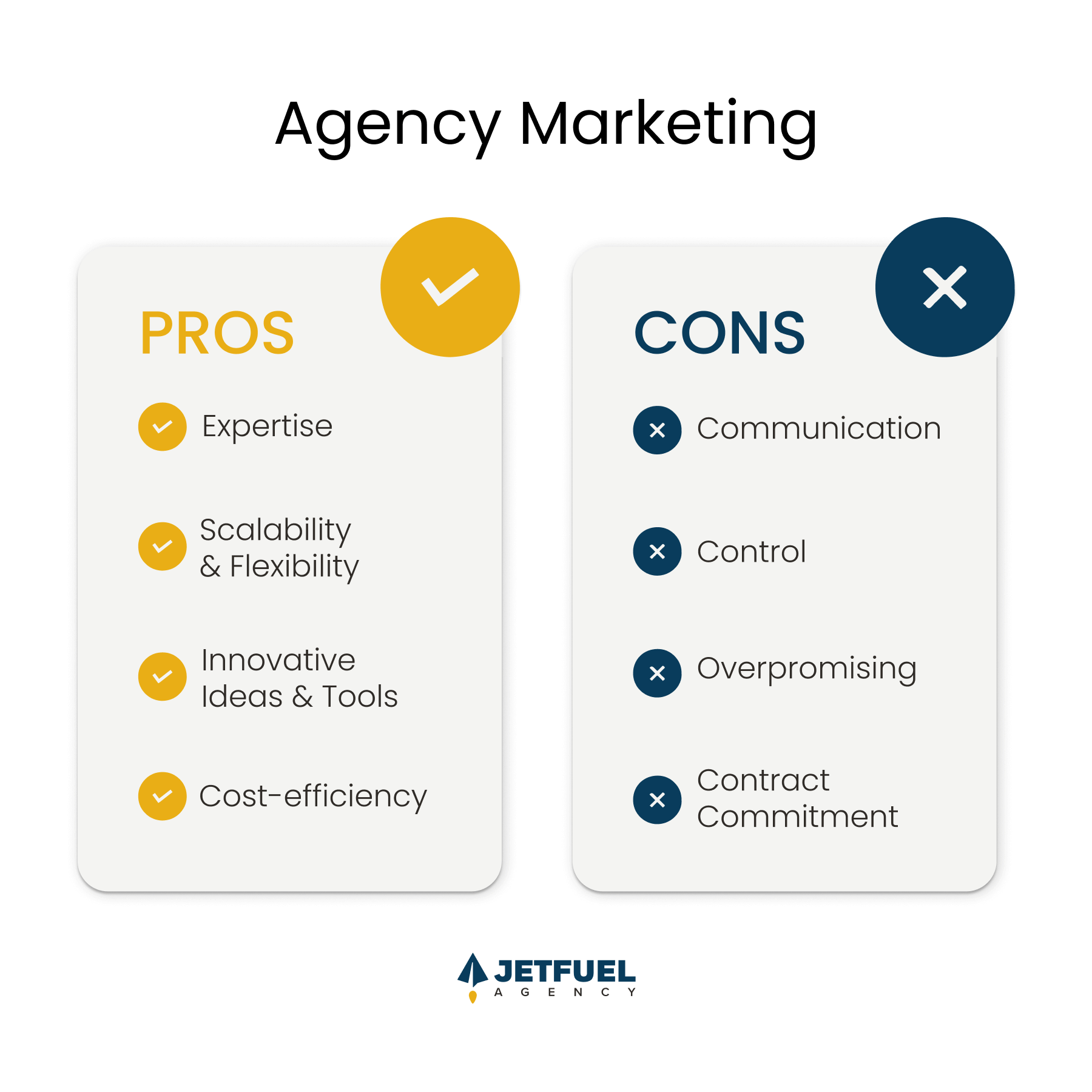
Advantages of Agency Marketing
Now, let’s dive into the positive sides of agency marketing through the following aspects:
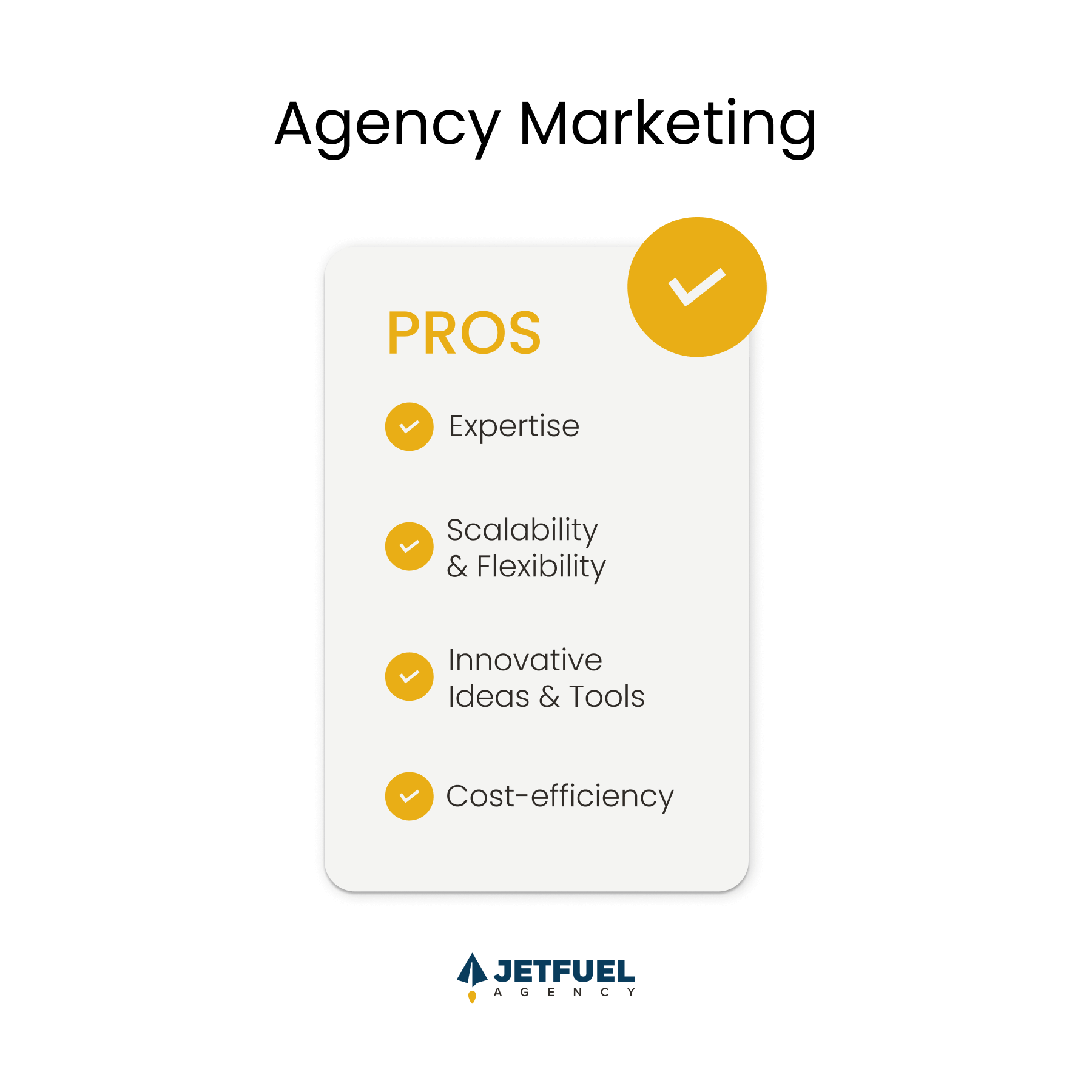
1. Expertise
When you team up with a marketing agency, you tap into a pool of specialized skills that can give your brand a real boost. Agencies bring in experts in digital marketing, social media, content creation, and SEO, offering a diverse range of talents to enhance your brand. They can provide fresh perspectives and creativity that in-house teams may miss out on.
While some companies have in-house experts who excel in their specific fields, they often lack the broad expertise and access to the latest marketing trends and technology that agencies possess.
For instance, agencies that work across various industries like e-commerce, healthcare, and technology gather valuable insights and best practices that can benefit all their clients.
This diverse experience allows agencies to bring fresh perspectives, innovative strategies, and proven tactics to each client they work with. By applying the expertise gained from managing a variety of accounts, agencies can offer tailored solutions, stay ahead of industry trends, and deliver exceptional results for their clients.

2. Scalability and Flexibility
Businesses need a marketing partner that can adapt and grow with them. That's where the flexibility and scalability of marketing agencies come in.
A good agency should be able to meet the changing needs of their clients, no matter the size of their business. Whether it's a small startup or a big company, the agency adjusts its services accordingly. This means being able to handle sudden increases in demand or adjusting strategies to fit new market trends.
Flexibility is also key in today's fast-paced business world. Agencies are able to quickly change and adapt their strategies based on their client's needs and goals. This might involve shifting focus to different platforms, trying out new tactics, or even completely changing the entire marketing approach.
By offering scalability and flexibility, marketing agencies become essential partners for businesses looking to stay ahead in the competitive market.
3. Innovative Ideas & Tools
Marketing agencies usually have a distinct edge over in-house marketing teams when it comes to innovative ideas and tools. As a result of being constantly exposed to a wide range of industries and clients, agencies gather insights and knowledge that can be applied across different marketing campaigns. They can think outside the box and come up with fresh and creative ideas that can help businesses stand out in a crowded marketplace.
Additionally, marketing agencies have access to a variety of modern tools and technologies that can enhance their campaigns and deliver better outcomes. They use advanced analytics platforms and social media management tools to improve their strategies, boosting engagement and conversions for their clients.
To stay competitive, marketing agencies need to keep up with the latest trends and research in the field. Working with different clients exposes them to new technologies and innovative approaches, giving them an edge in areas like keyword optimization, paid advertising, and creative design.
4. Cost Efficiency
In many cases, agency marketing can be more cost-effective than hiring an in-house team or handling your marketing efforts on your own.
Agencies typically charge flat retainer fees for ongoing services, or flexible fees based on a percentage of ad spend. Most of the time, it's cheaper than hiring a full in-house team as there’s no hassle of dealing with managerial headaches which sharply increase the cost, such as raises, performance reviews, hiring, firing, and more.
When businesses consider hiring an agency, they should weigh the costs against the benefits. It's important to figure out if the agency can really help your business grow and make your marketing efforts more profitable compared to the money you'll need to spend. Also, getting price estimates from a few different agencies and bargaining over the terms can make sure you get the most bang for your buck with your marketing budget.
In the end, while the price is a big deal, it's also important to think about how much an agency could help your business grow, give you access to fancy marketing tech, and provide expertise you might not have in-house. So, finding the right balance between these things will help you make a smart choice that fits your business goals and budget.
Cons of Agency Marketing
Agencies can be really great, but let’s move on to explore the disadvantages of outsourcing your marketing to an agency.
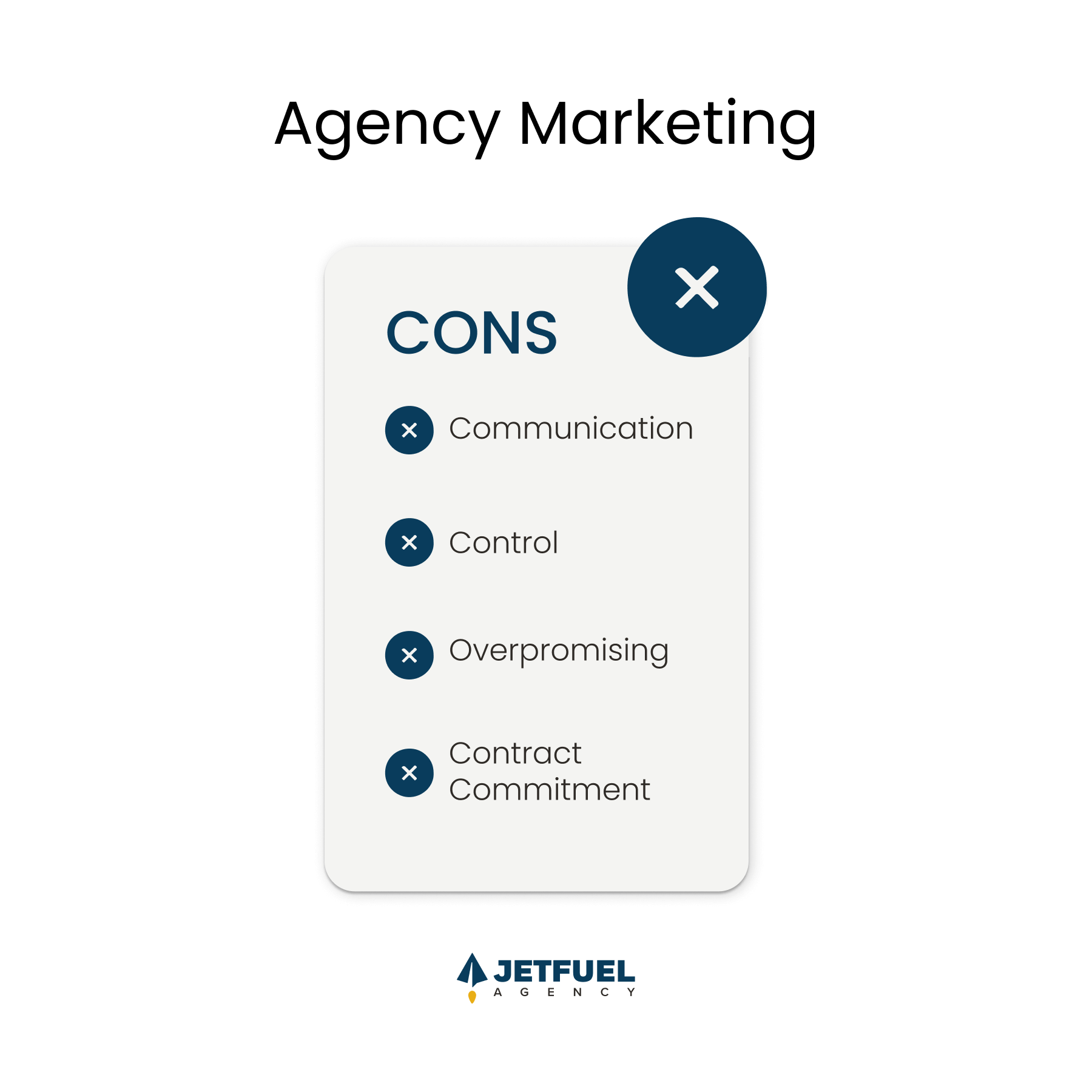
1. Communication
Working with a marketing agency means relying on effective communication so that your business objectives are understood and executed accurately. However, miscommunication can be a common challenge when working with external parties. Agencies often work with multiple clients simultaneously, which can cause delays in response time or misunderstandings regarding project details.
Well-run agencies have multiple layers in place to prevent potential miscommunication challenges.
- As the first layer, the agency should have an experienced account lead for each client. They are dedicated to understanding the brand's goals, positioning, and values, ensuring all initiatives meet or exceed expectations.
- Secondly, the team should proactively look for solutions to improve communication and cater to client's needs, using the latest communication tools and techniques. Using various communication channels, including emails, project management platforms, and other forms of communication, keeps everyone aligned and prevents misunderstandings.
- By prioritizing communication, the agency delivers a positive and rewarding client experience. Checking emails should be the first task for everyone the moment they log in for the day.
- Effective project management is crucial. So, if the agency uses good project management tools and platforms to track deadlines and communicate related to specific projects, it assures that tasks will be completed on time.
- Then, sticking to rigorous processes and controls, such as strict guidelines and marketing templates, the agency provides the best quality services, minimizing room for error and ensuring consistency in its deliverables.
- Lastly, regular check-ins and syncs, both internal and external, keep the team on track and provide clients with detailed performance updates and next steps.
2. Control
Working with an external agency often means surrendering a level of control over your marketing efforts. Companies may encounter difficulties guaranteeing that the agency comprehensively grasps and aligns with its vision, values, and objectives. This potential lack of alignment can result in campaigns that do not entirely resonate with the brand's identity, potentially diluting the messaging and impacting brand consistency.
Great agencies have open communication with all their clients and religiously keep track of agenda calls and action items that arise so that no important information gets lost. For example, the account lead keeps the marketers and the client on the same page. Then, every marketer is required to dig deep into every industry that their clients belong to and to study the client's branding guide, mission, and goals. They also strictly adhere to the approval process for their clients, which means several layers of internal revisions before submitting for client approval.
3. Overpromising
Some agencies fall into the trap of overpromising and underdelivering, which can lead to unhappy clients and a loss of trust. This problem typically arises when agencies make unrealistic guarantees or set unattainable expectations during the client onboarding process.
Here’s a solid game plan to avoid that trap: Stick to being as clear as glass and as honest as your best friend in all dealings with clients. By setting clear, achievable goals, managing client expectations effectively, and providing regular updates on campaign progress, agencies can build trust and credibility with their clients and build a positive reputation in the industry.
Besides, the real pros in the agency world will develop multiple scenarios based on historical data, current industry trends, and the client's new goals. For example, Scenario A maps out realistic goals and outcomes, while Scenario B showcases possible risks and factors that could harm performance. By forecasting one year and presenting both scenarios to the client, agencies ensure they are not overpromising and that the client understands all the factors and outcomes that can be expected.
This strategic approach allows agencies to maintain control over the planning process, providing clients with a clear understanding of what to expect. Also, by presenting two scenarios, agencies can manage client expectations and ensure their marketing efforts are aligned with the client's goals and current market conditions.
4. Contract Commitment
When agencies lock clients into long-term contracts without providing flexibility or demonstrating value early on, it can lead to dissatisfaction and strained relationships. Clients may feel trapped or obligated to continue working with an agency that is not meeting their expectations, resulting in a lack of trust and potential damage to the agency's reputation.
Also, being stuck in a strict contract can slow down an agency’s ability to quickly adapt to new market trends or client wishes, putting a damper on delivering effective strategies. To avoid all that, agencies need to focus on creating solid relationships that are all about trust, openness, and real results, not just paperwork. Introducing shorter test runs, pricing that reflects performance, and straightforward ways to part ways can pave the path for a partnership that works well for both agencies and clients.
While agencies strive to deliver results in line with client expectations, differences in interpretation or communication breakdowns can lead to misaligned strategies and creative outputs that deviate from the intended brand image and messaging. So, maintaining a balance between granting creative freedom to the agency and ensuring alignment with the brand's core identity is crucial for achieving successful marketing outcomes.
Section 3: When to Choose In-House, Agency Marketing, or Both
Deciding between developing an in-house marketing team, hiring an external agency, or employing a combination of both is pivotal for businesses that want to grow. The best choice varies based on the company's unique needs, strategic goals, and operational context.
Opting for In-House Marketing
Your business might lean towards an in-house marketing approach when:
- You Need Product Expertise: In scenarios where a deep, nuanced understanding of the product or service is essential for effective marketing, an in-house team, steeped in the company's culture and product intricacies, can offer unparalleled insights and strategies.
- You Need Strong Cultural & Brand Alignment: Companies with strong, distinct cultures or those in niche markets might prefer in-house teams to ensure every marketing message resonates with their brand identity and values.
- You Have Long-Term Plans: For organizations focused on long-term strategic growth, maintaining an in-house team allows for consistent, ongoing alignment of marketing strategies with broader business objectives.
When to Hire a Marketing Agency
On the contrary, agency marketing may be more advantageous when:
- You Need Immediate Results: Agencies can quickly mobilize resources and expertise to launch campaigns, making them ideal for businesses seeking fast market impact.
- You Lack an Effective Marketing Strategy: Companies struggling to develop or implement a successful marketing strategy might find the fresh perspective and diverse expertise of a marketing agency invaluable.
- Budget Constraints: Small to medium-sized enterprises might find agencies cost-effective, especially when needing a broad range of marketing services without the overhead of full-time salaries and benefits.
Blending In-House and Agency Services
Many businesses find that a hybrid approach—combining in-house and agency marketing services—offers the best of both worlds:
- Extra Flexibility: This model allows companies to capitalize on the deep brand knowledge and strategic focus of their in-house team while also benefiting from the creative diversity, specialized skills, and scalability of an agency.
- Cost-Effective and Comprehensive Marketing Solutions: Employing both in-house and external resources can provide a more comprehensive marketing strategy that is both cost-effective and adaptable to changing business needs.
Contact jetfuel.agency to find out how our additional services can work together with your in-house marketing team.
To sum up, the choice between in-house marketing, agency marketing, or a combination of both depends on a number of factors, including the need for product expertise, cultural alignment, budget considerations, and strategic objectives. In other words, by carefully assessing their specific needs and market conditions, businesses can select the most suitable model to drive their marketing success forward.
Overcoming Challenges and Making the Decision
When you're trying to decide between building your own marketing team, hiring an outside agency, or maybe even a mix of both, it can feel overwhelming. So, here are some simple steps to help you make the best choice:
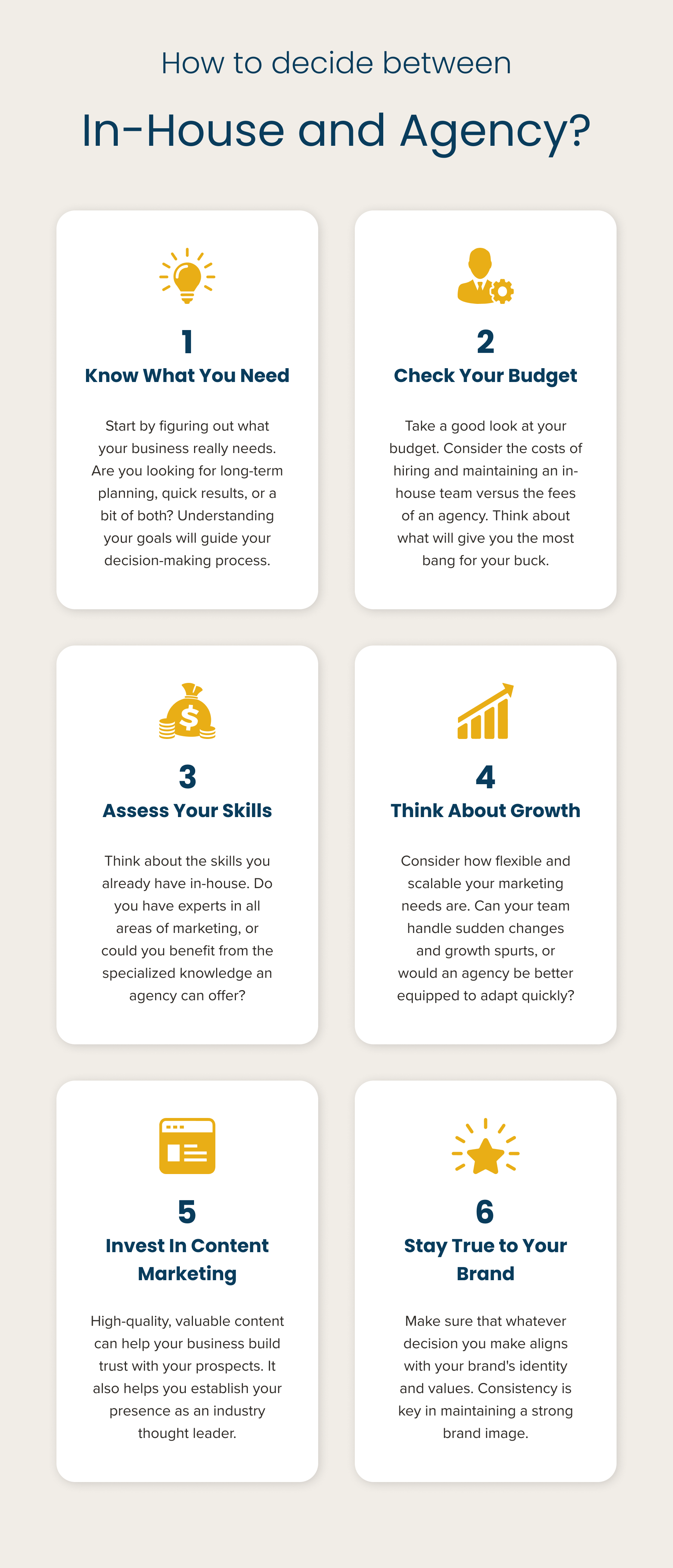
By following these steps and thinking about what's best for your business in terms of needs, budget, skills, growth potential, and brand identity, you'll be better equipped to make a smart choice that sets you up for marketing success.
Good luck!
